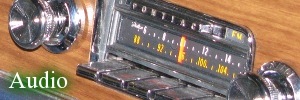















China's Geely Wows Detroit Auto Show |
|---|

 Topics: Geely, NAIAS
Topics: Geely, NAIAS
|
Stuart Cohen
VOA News
Detroit, Michigan
January 20, 2006
Audio Version 1,047KB mp3
Audio Version 697KB RealPlayer
More than three-quarters of a million people are expected to attend the annual North American International Auto Show in Detroit, Michigan, this week (January 14-22). It's the biggest show of its kind in the U.S. and one of the biggest auto shows in the world, giving America's Big Three and other automakers from around the world a chance to show off their new car line-ups. But for the first time in the show's 99-year history, a Chinese auto company is exhibiting a car they hope to be selling soon in the United States.
The Chinese car company, Geely, has generated some of the biggest buzz at this year's auto show -- with one of the smallest displays. The big U.S. companies -- General Motors, Ford and Chrysler -- are all spending millions on flashy exhibits with dozens of new cars. But Geely's decidedly bare-bones display isn't even on the show floor at Detroit's Cobo Center…it's in the lobby. And it features just one small car, the 4-door CK sedan, with one very low price.
Company founder, Shufu Li, hopes to be selling cars in the United States by 2008. "When we first enter the American market, our targeted consumers will be lower- and middle-income families," he says. "Our car will be sold at less than $10,000."
Geely has been in the car business for less than 10 years and the company sold just 150,000 cars last year. They only expect to sell 25,000 cars in the U.S. their first year. That level of sales might not be much more than an annoyance to Detroit's car-building juggernaut. But Geely isn't the only firm that wants to enter the American market. Another Chinese company, Chery, has also announced plans to sell cars in the U.S.
Rebecca Lindland is chief automotive analyst with the market research firm, Global Insight. She says Detroit shouldn't write off companies like Geely, but Geely shouldn't necessarily expect a smooth ride. "I think it's foolish to say that it's not a serious threat, but I think that they may be slightly underestimating how difficult it is to penetrate the U.S. market," she says. "Even long-term, established brands here, like GM and Ford, have trouble understanding the consumer. So it's not as easy to just pop into the States and sell, you know, 50,000 vehicles."
But initial reviews of the Geely car have been pretty good. On the last of the industry preview days, when auto company employees come to check out the competition before the show opens to the general public, Geely's exhibit was mobbed with everyone from executives to engineers to parts suppliers, and all of them were giving the CK a thorough looking over. And many of them, like Aaron Drexel, who works for Daimler-Chrysler, liked what they saw.
"It's actually pretty impressive," he says. "You know, you can tell it's an inexpensive, kind of a starter car, but it's pretty nice. It's a big difference between (it and) a $20,000 or $30,000 Toyota or Chrysler, but for an entry level car, it's very nice. If I didn't work for Daimler-Chrysler, I would consider it as one of my buying options."
After looking at the Geely, Chrysler engineer Dennis Pasco thinks Detroit has something to worry about. "At $10,000, if they can bring their quality up, if the crash test ratings are there, yeah, we got a problem," he says. " We're going to have a lot more competition, for sure."
Analyst Rebecca Lindland believes Geely's success will depend less on its ability to sell cars, than on its ability to generate customer confidence. To do that, she says, the company will need to build a reliable network of repair facilities to service the car…something Lindland says she's all too familiar with. "I bought one of the first Minis that came into the States in 2002," she recalls. "I bought it in downtown Boston, where I live, and I went out to see a friend of mine in western Massachusetts. So I was about 120 miles (200 kilometers) from Boston, and the car wouldn't start. And I went down to the local mechanic and he said I'm not going near that car, I don't know anything about it. So, that's what people are going to run into, where complete unfamiliarity with this vehicle, [means] mechanics aren't, aren't going to go near it. You could be anywhere and run into problems."
Roughly translated, Geely means good luck. But Chinese car companies are going to need more than luck if they hope to be more than just a bump in the road of America's automotive marketplace
